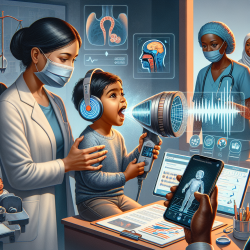Introduction
In the realm of speech language pathology, the integration of cutting-edge technology is pivotal for advancing therapeutic practices. Virtual Reality (VR) is emerging as a transformative tool in assessing and enhancing executive functions, especially in children. Executive functions encompass a range of cognitive processes crucial for daily activities, such as problem-solving, planning, and multitasking. The ecological limitations of traditional assessments have prompted researchers to explore VR-based tools that simulate real-life scenarios, offering a more dynamic and engaging approach to cognitive evaluation and rehabilitation.
Understanding Executive Functions
Executive functions are a set of cognitive processes that include working memory, flexible thinking, and self-control. These functions are essential for managing oneself and one's resources to achieve a goal. They are crucial in everyday tasks such as organizing, planning, and executing activities, which are foundational for successful learning and social interactions in children.
The Promise of Virtual Reality
The systematic review "Available Virtual Reality-Based Tools for Executive Functions" underscores the potential of VR in providing an ecological assessment and treatment of executive functions. VR offers a controlled yet realistic environment where children can engage in tasks that mimic real-world challenges. This immersive experience not only enhances the ecological validity of assessments but also increases engagement and motivation among young users.
Applications in Therapy
For practitioners, integrating VR into therapy sessions can significantly improve outcomes for children with executive function deficits. VR-based tasks can be tailored to individual needs, allowing for personalized intervention strategies. For instance, VR environments can simulate a virtual classroom or a shopping scenario, where children can practice decision-making, planning, and problem-solving in a safe and controlled setting.
Encouraging Further Research
While the current research provides promising insights, there is a continuous need for further studies to explore the long-term benefits of VR in cognitive rehabilitation. Practitioners are encouraged to collaborate with researchers to develop and refine VR tools that cater to diverse needs. By doing so, we can ensure that these innovative solutions are accessible and effective for a broader range of children.
Conclusion
Incorporating VR into speech language pathology offers a novel approach to enhancing executive functions in children. As we continue to harness the power of technology, it is crucial to base our practices on data-driven decisions and evidence-based research. By embracing these advancements, we can create more effective and engaging therapeutic interventions that foster better outcomes for young minds.
To read the original research paper, please follow this link: Available Virtual Reality-Based Tools for Executive Functions: A Systematic Review.










